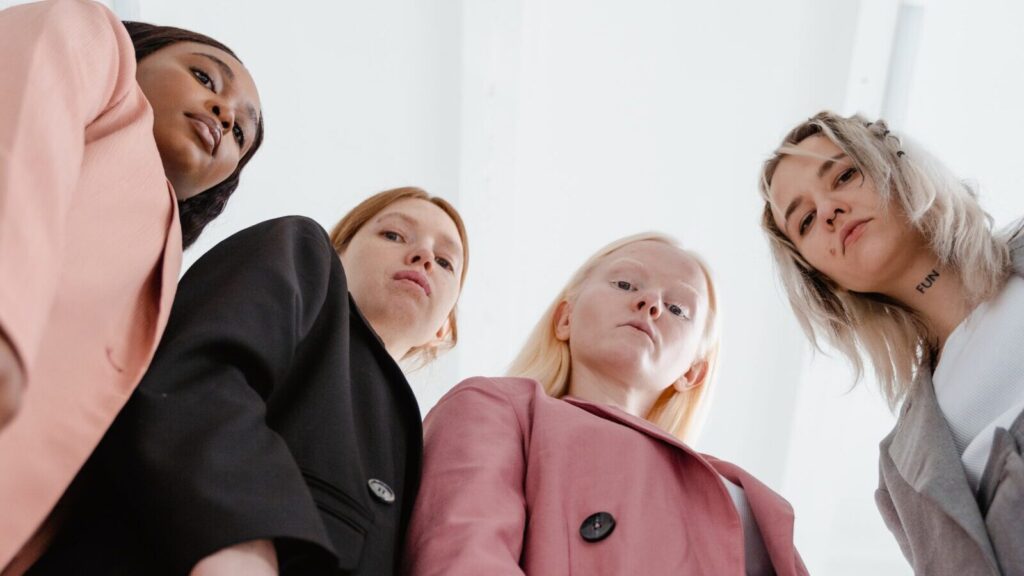Molly Wilson
She only drinks beer, doesn’t wear makeup and can’t be friends with other women because they’re “too much drama.” She’ll try to embarrass you and put you down because she perceives you as competition for male attention. She is a pick-me girl.
You may have come across this girl at school or perhaps even in adult life, coined on TikTok as the ‘pick-me girl’. Urban Dictionary defines a ‘pick-me girl’ as “a girl who seeks male validation by indirectly or directly insinuating that she is ‘not like other girls.”
On TikTok you’ll find countless POVs (point of views) of “the pick-me girl who wants your boyfriend” or “a pick-me girl gaming with the boys.”
A Brief History of the Pick-Me Girl
“This trend is undeniably centred around superiority”
In the early 2010s, it was a compliment to not be like other girls. The early version of the Pick-Me Girl gained initial traction on Tumblr as a response to distinguish women from the Basic Bitch archetype.
While basic girls liked Starbucks, Ugg boots and the colour pink, these girls liked black, playing video games and scrolling Tumblr. The trend coincided with the rise of alternative subcultures like emo and grunge and is likely why many “I’m not like other girls” posts mention the colour black and alternative music.
In 2014, r/NotLikeOtherGirls was created, marking a distinct shift in attitude towards these women and marking the conception of the pick-me girl.
Now girls who have stereotypically male interests were seen as trying too hard to gain male attention. But, really it has just become another way to make women the butt of the joke.
https://www.tiktok.com/@elongatedmusk/video/7206051312025210154?is_from_webapp=1
The pick-me girl archetype is not confined to TikTok. It is also found in film and television and is perhaps a response to the stereotypical damsel in distress trope, as female characters find new ways to define themselves.
Think Katniss Everdeen or Arya Stark – two female characters who exhibit distinctly masculine traits and defy the damsel in distress trope in every way possible.
But this trend is undeniably centred around superiority, pitting women against each other in the fight for male validation. It reinforces negative stereotypes about women and rewards them for embodying masculine traits.
Claiming to “not [to be] like other girls” inherently infers that other girls are shallow, vapid and boring.
https://twitter.com/pixeliien/status/1290008776548839425
Pick-Me Girls On TikTok
“While anti-Pick-Me’s believe they are criticising misogyny, they often blame sexism on women in the process.”
The phrase itself gained traction on TikTok in 2021. It was primarily used in videos where the creator acts out a hypothetical situation, commonly known as ‘POVs’. Situations include the pick-me girl cosying up to your boyfriend, flirting with him and even putting you down. She’ll make fun of you for not being “one of the boys.”
POVs of the pick-me girl being ‘humbled’ are also popular. They show her getting called out by the man she is pursuing for being mean or attention-seeking.
Comment sections are filled with people expressing disgust towards these women. One user commented on video: “My anger issues could never.”
Another chimed in: “Can u do pick me girl gets dumped in a lake?”
Although these videos are exaggerated, they make viewers believe women act like this in real life. While anti- pick-me’s believe they are criticising misogyny, they are contributing to it.
one thing we really need to leave behind in 2023 is the “I’m not like other girls!” attitude.
of course you aren’t, we are all different, that does not make you better than other girls, it makes you extremely normal, get off your high horse
— madeline odent (@oldenoughtosay) July 23, 2023
The Problem with Demonising Pick-Me Girls
Internalised misogyny is when women express hatred and distrust towards other women, but doesn’t this also sound like the anti-pick-me girl?
Georgia, a 21-year-old student said: “I think it’s another way people have managed to pit women against each other and put us in categories to judge us.”
Categorising women into boxes perpetuates comparison and drives the fight for superiority, and if women are fighting each other, we are unable to focus on the fight against sexism.
“Criticising misogyny should focus on the patriarchal systems that perpetuate sexism, not belittling the women who suffer its effects”
Georgia continued: “From what I’ve seen, the pick-me girl trend is young girls picking up stereotypical male interests to appeal to boys their age and rejecting girly things for the validation of men.”
Young women have always been made fun of for their interests, whether it’s music, clothes or celebrity crushes. With many of the Pick-Me Girl POVs depicting teenage girls, it has become yet another way for people to shame young women.
While the trend originally served to call out the misogynistic behaviours of Pick-Me Girls, it has become an acceptable way to voice hatred for women.
READ MORE:
-
BEIGE FLAGS: LOVING THE LITTLE THINGS
-
‘CYBERCHONDRIA’: TIKTOK AND MENTAL HEALTH SELF-DIAGNOSIS
-
THE #HYPERFEMININE TIKTOK MOVEMENT AS A RESPONSE TO TOXIC MASCULINITY
Feature image courtesy of Tima Miroshnichenko on Pexels. No changes were made to this image. Image license found here.

